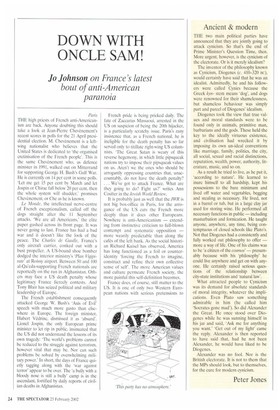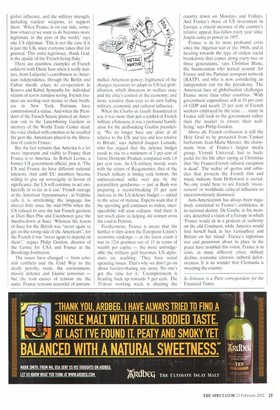DOWN WITH ONCLE SAM!
Jo Johnson on France's latest bout of anti-American paranoia
Paris THE high priests of French anti-Americanism are back. Anyone doubting this should take a look at Jean-Pierre Chevenement's recent scores in polls for the 21 April presidential election. M. Chevenement is a leftwing nationalist who believes that the United States is dedicated to 'the organised cretinisation of the French people'. This is the same Chevenement who, as defence minister in 1991, walked out on Mitterrand for supporting George H. Bush's Gulf War. He is currently on 14 per cent in some polls. 'Let me get 15 per cent by March and let Jospin or Chirac fall below 20 per cent, then the whole system will shudder,' promises Chevenement, or Che as he is known.
Le Monde, the intellectual nerve-centre of French exceptionalism, called off the dogs straight after the 11 September attacks. 'We are all Americans,' the elite paper gushed across its front page. It was never going to last. France has had a bad war and it doesn't like the look of the peace. The Charles de Gaulle, France's only aircraft carrier, conked out with a bust propeller. A US-bound shoe bomber dodged the interior ministry's 'Plan Vigipirate' at Roissy airport. Between 50 and 100 al-Qa'eda-supporting French nationals are reportedly on the run in Afghanistan. Others may face a US death penalty whose legitimacy France fiercely contests. And Tony Blair has seized political and military leadership of Europe.
The French establishment consequently attacked George W. Bush's 'Axis of Evil' speech with much more gusto than elsewhere in Europe. The foreign minister, Hubert Vedrine, dismissed it as 'absurd'. Lionel Jospin, the only European prime minister to let rip in public, insinuated that the US did not understand the lessons of its own tragedy: 'The world's problems cannot be reduced to the struggle against terrorism. however vital that may be. Nor can such problems be solved by overwhelming military power.' In short, the days of France quietly tagging along with the 'war against terror' appear to be over. The 'a bully with a bloody nose is still a bully' camp is in the ascendant, fortified by daily reports of civilian deaths in Afghanistan. French pride is being pricked daily. The fate of Zaccarias Massaoui, arrested in the US on suspicion of being the 20th hijacker, is a particularly scratchy issue. Paris's zany insistence that, as a French national, he is ineligible for the death penalty has so far served only to titillate right-wing US columnists. 'The Great Satan is weary of this reverse hegemony, in which little pipsqueak nations try to impose their pipsqueak values on us. Aren't we the ones who should be arrogantly oppressing countries that, unaccountably, do not have the death penalty? . . . We've got to attack France. What are they going to do? Fight us?' writes Ann Coulter in the Jewish World Review.
It is probably just as well that the JWR is not big box-office in Paris, for the arrogance of the US cuts the French more deeply than it does other Europeans. Nowhere is anti-Americanism — extending from instinctive criticism to full-blown contempt and systematic opposition — more wearily predictable than along the cafés of the left bank. As the social historian Richard Kuisel has observed, America has long functioned as a foil or counteridentity 'forcing the French to imagine, construct and refine their own collective sense of self. The more American values and culture permeate French society, the more painful this self-definition becomes.
France does, of course, still matter to the US. It is one of only two Western European nations with serious pretensions to global influence, and the military strength. including nuclear weapons, to support them. When France is on our side, somehow whatever we want to do becomes more legitimate in the eyes of the world, says one US diplomat. This is not the case if it is just the UK, since everyone takes that for granted. This extra legitimacy, thank God, is the upside of the French being flaky.'
There are countless examples of French solidatite with Oncle Sam when it really matters, from Lafayette's contribution to American independence, through the Berlin and Cuban missile crises, to co-operation in Kosovo and Kabul. Sympathy for individual victims of terror remains strong. French firemen are sending over money to their brothers in New York. Parisians have commissioned a statue. And when the President of the French Senate planted an American oak in the Luxembourg Gardens in memory of the World Trade Center dead, his voice choked with emotion as he recalled the part the Americans played in the liberation of eastern France.
But the fact remains that America is a lot more important and visible to France than France is to America. As Robert Levine, a former US government official, puts it, 'The US and France do have different national interests. And until EU members become willing to give up sovereignty in favour of significance. the US will continue to act unilaterally in so far as it can.' French outrage at the American 'hypeipuissance', as Vedrine calls it, is unrelenting; the language has altered little since the mid-1950s when the US refused to save the last French garrison at Dien Bien Phu and Eisenhower gave the thumbs-down at Suez. 'Whereas the lesson of Suez for the British was "never again to get on the wrong side of the Americans", for the French it was "never again to depend on them".' argues Philip Gordon, director of the Centre for USA and France at the Brookings Institution.
The issues have changed — from colonial conflicts and the Cold War to the death penalty, trade, the environment, missile defence and Islamic terrorism — but the root causes of tension are the same. France remains resentful of untram melled American power; frightened of the changes necessary to adapt to US-led globalisation, which threatens its welfare state and the elite's control of the economy; and more sensitive than ever to its own fading military, economic and cultural influence.
When the Charles de Gaulle floundered at sea, it was more than just a symbol of French military effeteness; it was a profound humiliation for the atoll-nuking Gaullist presidency. 'We no longer have any clout at all relative to the US, and less and less relative to Britain,' says Admiral Jacques Linxade, who has argued that the defence budget needs to rise to a minimum of 3 per cent of Gross Domestic Product, compared with 1,8 per cent now. As US military morale soars with the return of Reaganornics, that of the French military is hitting rock bottom, An unprecedented strike over pay by the paramilitary gendarmes — just as Bush was preparing a record-breaking 15 per cent increase in the US defence budget — added to the sense of malaise. Experts warn that if the spending gulf continues to widen, interoperability will soon collapse. And there is not much gloire in helping old women cross the road in Pristina.
Furthermore, France is aware that the further it slips down the European Union's economic rankings — at the latest count it was in 12th position out of 15 in terms of wealth per capita — the more unbridgeable the military gulf becomes. US diplomats are scathing: They have social spending issues. That's why we don't go on about burden-sharing any more. No one's got the time for it.' Unemployment is heading back up towards 9 per cent. The 35-hour working week is shutting the country down on Mondays and Fridays. And France's share of US investment in Europe, a crucial measure of the country's relative appeal, has fallen every year since Jospin came to power in 1997.
'France is in its most profound crisis since the Algerian war of the 1960s, and is heading towards the type of violent social breakdown that comes along every two or three generations,' says Christian Blanc, the businessman who turned around Air France and the Parisian transport network (RATP), and who is now considering an independent run for the presidency. The American face of globalisation challenges France more than other countries. 'With government expenditure still at 54 per cent of GDP and nearly 25 per cent of French workers employed by the state. . . many in France still look to the government rather than the market to ensure their wellbeing,' says Philip Gordon.
Above all, French civilisation is still the Holy Grail to be protected from Yankee barbarism. Jean-Marie Messier, the charismatic boss of France's largest media group, Vivendi Universal, had to backpedal for his life after saying at Christmas that the Franco-French cultural exception is dead'. The welter of quotas and subsidies that protects the French film and music industry from Hollywood is sacred. No one could bear to see French 'rayonnement' or worldwide cultural influence so unceremoniously dismissed.
Anti-Americanism has always been negatively correlated to France's confidence in its national destiny. De Gaulle, in his memoirs, described a vision of a Europe in which 'France would sit in a position of authority on the old Continent, while America would find herself back in her hemisphere and Britain on her island'. France's inglorious war and pessimism about its place in the peace have troubled this vision. France is in crisis, in many different crises: military decline, economic sclerosis, cultural defensiveness. It is no wonder that Chemania is sweeping the country.
.1"o Johnson is a Paris correspondent for the Financial Times.







































































 Previous page
Previous page